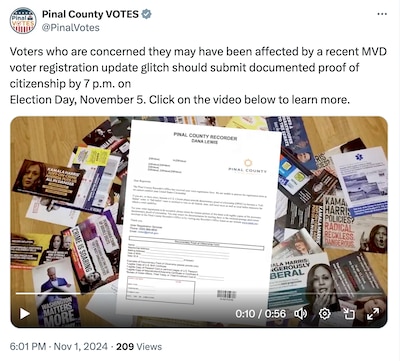Votebeat is a nonprofit news organization reporting on voting access and election administration across the U.S. Sign up for Votebeat Arizona’s free newsletter here.
Pinal County, Arizona, incorrectly told hundreds of longtime residents they needed to provide proof of citizenship before voting in Tuesday’s election.
The county’s decision to flag these voters’ registrations came to light when some of the voters tried to cast an early ballot for Tuesday’s election, and shortly after were notified by the county recorder’s office that they needed to provide proof of citizenship before 7 p.m. Election Day in order to have their ballot count.
The office backtracked on that decision after meeting with the Secretary of State’s Office on Friday. These voters — nearly 900 — will no longer need to provide proof of citizenship, County Recorder Dana Lewis said Friday night.
If the voters had already attempted to vote an early ballot and had the ballot put on hold, those ballots will now be counted. Others who had not cast their ballots yet will not see an issue when they go to vote, she said.
Maricopa city resident James Wilson was one of the voters who had their registrations flagged incorrectly.
He told Votebeat Friday afternoon that he had cast his early ballot in a drop box Wednesday, and was notified Wednesday night he needed to provide proof of citizenship.
“I was like, ah, crap, I have to jump through hoops now,” he said.
On Friday night, though, after Votebeat began to ask the county and Secretary of State’s Office questions about the problem, Wilson got a call from the recorder’s office saying that was no longer the case, and his ballot would be counted. He said he was happy, but still frustrated that he had to deal with the problem.
Another voter contacted the Election Protection Arizona hotline run by a coalition of organizations, at 1-866-OUR-VOTE. The coalition reached out to the Secretary of State’s Office and Lewis on Friday, said Alex Gulotta, Arizona director of All Voting Is Local.
The voters who were affected had tried to update their voter registration just before the Oct. 7 voter registration deadline. The county had flagged these registrations because of changes the county made to the way it was processing voter registration forms in response to two separate court decisions, both regarding requirements in state law for voter proof of citizenship.
Arizona has a unique law that requires proof of citizenship to vote in state and local elections. Federal law requires applicants only to attest to their citizenship to vote. If an Arizona applicant doesn’t provide proof of citizenship, they are placed on a “federal only” voter list and are restricted to voting in federal contests like presidential and congressional races.
In the first recent court decision related to the state’s laws on proof of citizenship, the U.S. Supreme Court ruled Aug. 22 that county recorders should completely reject voter registration forms from voters if they register using a state form and don’t provide proof of citizenship. Previously, these voters would have been registered as federal-only voters. The ruling is in effect until the courts can fully consider the case.
The second court decision came after the state realized that a problem with the Motor Vehicle Division database had allowed about 218,000 longtime driver’s license holders to become full ballot voters, even though they had not provided proof of citizenship. The Arizona Supreme Court ruled Sept. 20 that these voters would not have to provide citizenship proof until after the November election.
Still, starting sometime soon after the state discovered the MVD problem, the state reprogrammed its system to flag those 218,000 voters if they tried to make a change to their voter record, to notify the counties that they hadn’t yet provided proof of citizenship. The Secretary of State’s Office provided guidance in early October to county recorders telling them that, even though the system was flagging these voters, they should continue to allow them to vote a full ballot until after November.
Instead, from the time the state’s system was reprogrammed to the voter registration deadline on Oct. 7, if a voter in Pinal County on this list of 218,000 tried to update their voter record using a state form, the county flagged their registration until they provided proof of citizenship.
The county mailed at least some of these residents a letter to tell them they needed to provide proof of citizenship before they voted.

This was the guidance even up until 5 p.m. Friday, when Lewis posted a video on social media platform X that said the voters needed to provide citizenship proof before 7 p.m. Election Day.
Votebeat spoke to Lewis around 7 p.m. Friday. She said that the county had just met with the Secretary of State’s Office to review the list of voters affected by the MVD problem, and determined that most of those who had been notified no longer needed to provide the citizenship proof.
Shortly after, the recorder’s office had deleted the video.
Correction, Nov. 2: This article originally misstated that the Aug. 22 decision came from the Arizona Supreme Court.
Jen Fifield is a reporter for Votebeat based in Arizona. Contact Jen at jfifield@votebeat.org.


